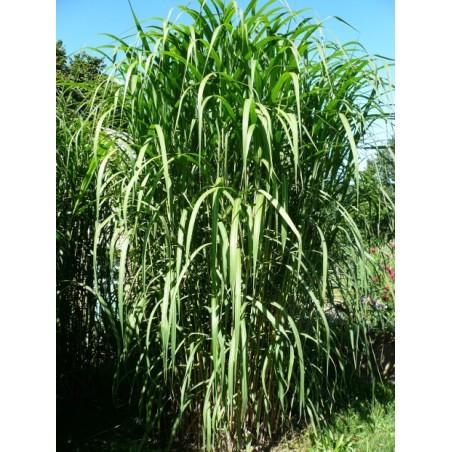







Miscanthus giganteus - Elephant Grass
2 rhizomes
Shipped in February only
SEASONAL PRODUCT
(Additional shipping costs if 2 separate shipments)
-
Miscanthus x giganteus is a sterile triploid hybrid resulting from a natural crossing between Miscanthus sinensis (diploid) and Miscanthus sacchariflorus (tetraploid)
Good to Know
Miscanthus x giganteus IS NOT MISCANTHUS FLORIDULUS
MISCANTHUS X GIGANTEUS HAS NO VARIETIES (cf. "alligator" etc.)
Elephant Grass is a remarkable ornamental grass, used to quickly produce hedges of 3 to 4 m in height that will become dense and impenetrable after a few years, or in isolated clumps in the center of an open space
Giant Miscanthus is not invasive : Unlike Bamboo, it does not sucker, and it does not spread by seeds like Cortaderia selloana (Pampas Grass) since it is sterile
It will stay where you planted it
The clumps can remain in place for up to 25 years without requiring regeneration
The juice of the young shoot has medicinal properties: anticoagulants, diuretics, and antipyretic
The leaves and Inflorescences of Giant Miscanthus can be used as a fast yellow dye
Since the plant traps atmospheric carbon very efficiently (C4 photosynthesis), it is used as a source of biomass and cultivated on an industrial scale to produce biofuel
Miscanthus X giganteus is sterile: It makes flowers but does not produce fertile seeds due to its triploidy
Therefore, no one should sell Miscanthus X giganteus seeds
However, you will find in our Catalogue Miscanthus sinensis seeds
(non-triploid species that produces fertile seeds)
-
| Jan | Feb | Mar | Apr | May | Jun | Jul | Aug | Sep | Oct | Nov | Dec | ||
|---|---|---|---|---|---|---|---|---|---|---|---|---|---|
| Z4 | etc. | ||||||||||||
Plant the rhizomes of Miscanthus x giganteus in February and March 20-30 cm apart and 5-10 cm deep, horizontaly with their roots downward, in a well prepared ground at full sun exposure
Young shoots will emerge by the end of april-beginning of may
Water regularly if the soil gets dry the first few months and during summer on the planting year
Established plants do not need special care, starting on their second year
In March, cut all the stems 20cm above the ground
You can use them as stakes for the season, for crafts, as mulch, or as fuel, for example
Remarks
Prefer to buy our rhizomes, which are manually selected with buds and come with roots
(= rhizomes of the year which will grow, and not old rhizomes of 2, 3 or 4 years, without buds and which will not grow)
In addition, the rhizome format:
-
Learn to Use this Flavonoid Plant with our Courses:
You might also like
Payment :
PayPal < 150 €
Check < 850 €
Bank Wire > 149 €
Thank you for your kind understanding